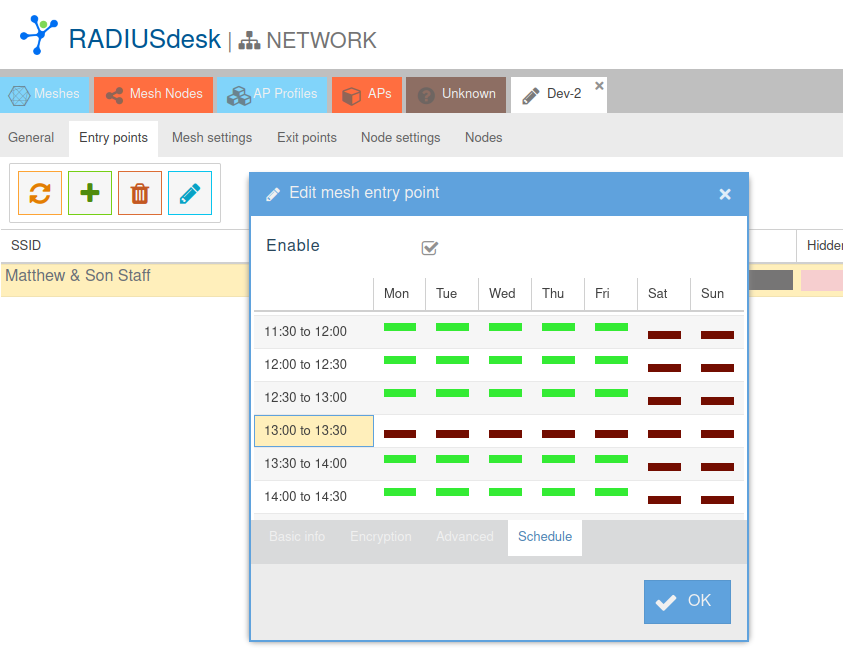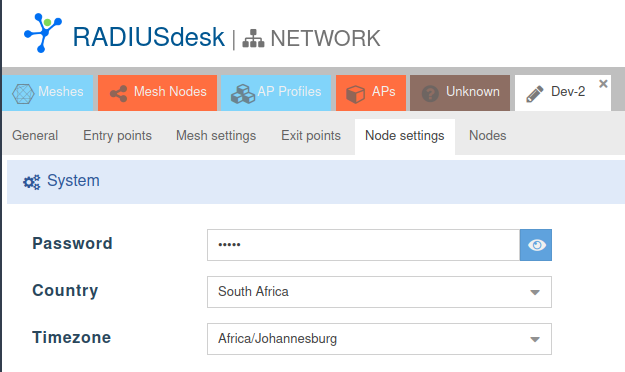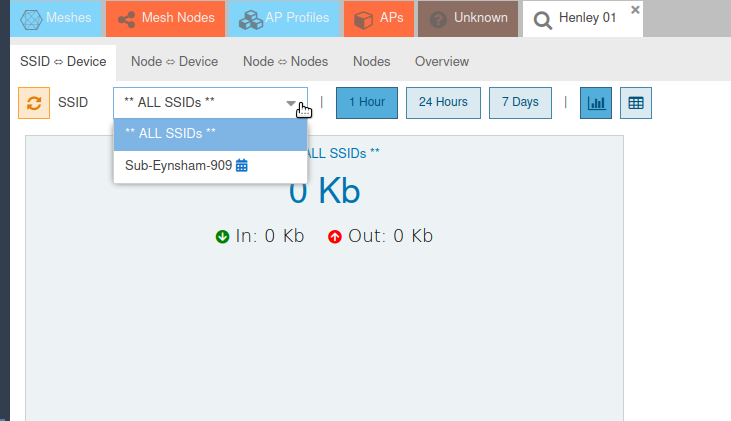Table of Contents
WiFi Schedules
Introduction
- In February 2023 we introduced an enhancement to MESHdesk and APdesk that allows you to specify an optional schedule per SSID.
- The schedule allows you to specify which times the WiFi radio will make the various SSIDs available to users.
- Home deployments can have two SSIDs.
- One will be used by the adults which does not have any schedule.
- A second SSID can be used by the kids and have a schedule associated to it.
- SME deployments can have a dedicated staff SSID with a schedule that matches office hours.
Applying A Schedule

- To apply a schedule, simply select a Mesh or AP Profile and edit it.
- On the Mesh network select an Entry Point to which you want to apply the schedule and edit it.
- On the AP Profile select the SSID to which you want to apply the schedule and edit it.
- There is a Schedule tab that allows you to enable the schedule and then which time-slots the SSID should be available.
- After you set up the schedule to your liking, click OK to save the schedule.
- Reboot the Access Points to which this schedule apply to allow it to fetch its schedule from the controller.
- Any time you want to make a change to the schedule you can simply edit the existing schedule, save it and reboot the Access Point for the changes to apply.
- To toggle a whole column; select the heading e.g. Mon, Tue etc.
- To toggle a whole row; select the the time-slot on the left e.g. 10:00 to 10:30 etc.
Some important points
- When applying a WiFi Schedule it is important that the timezone on the Access Point matches where it is deployed.

If the timezone is not set correctly the results might be not as expected.
Some visiual cues
- We made sure that that there is a clear indication in the GUI for you to see the SSIDs which has a Schedule applied to them.

- Edit - Listing Entry Points or SSIDs

- View - Showing stats per SSID graph view

- View - Showing stats per SSID grid view
Technical Details
- The WiFi schedules taps into the existing schedules feature of the MESHdesk firmware.
- If there is a schedule associated with a SSID, the controller will insert entries to the schedules JSON reply data.
- Below is a snippet which we will discuss further.
"schedules": [ { "id": 35, "mo": true, "tu": false, "we": false, "th": false, "fr": false, "sa": false, "su": false, "event_time": "0", "command": "\/etc\/MESHdesk\/utils\/ssid_on_off.lua \u0027Dev\u0027 \u0027off\u0027", "type": "command" }, { "id": 36, "mo": false, "tu": true, "we": false, "th": false, "fr": false, "sa": false, "su": false, "event_time": "0", "command": "\/etc\/MESHdesk\/utils\/ssid_on_off.lua \u0027Dev\u0027 \u0027off\u0027", "type": "command" },
- Each entry will have a event_time (0 means 00:00 and 1439 is 23:59)
- Then we also have a flag for the day of the week.
- We also have a command to execute.
- To turn a SSID on and off we have a utility script /etc/MESHdesk/utils/ssid_on_off.lua
- This is given the SSID and the action (on or off) as arguments.
- With this implementation the activating and disable of a SSID does not depend on communication to the controller but is offloaded to the Access Point when it fetches its configuration.
- It is however important that the time on the Access Point matches the timezone where it is deployed for the minute of the day when the schedule entry runs to match the actual time where the Access Point is deployed.